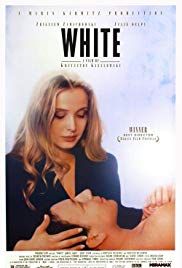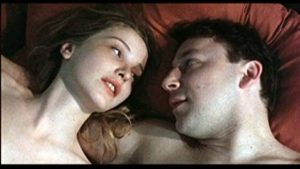Three Colors: White [Trois Couleurs: Blanc] **** (1994, Zbigniew Zamachowski, Julie Delpy, Janusz Gajos, Jerzy Stuhr, Jerzy Trela) – Classic Movie Review 8720
Three Colors: White [Trois Couleurs: Blanc] (1994), the second part of Krzysztof Kieslowski’s trilogy (after the 1993 Three Colours: Blue) is billed as ‘A Comedy’, but there is no impression anywhere in the movie of a sense of fun or humour, let alone a laugh.
Zbigniew Zamachowski plays Karol Karol, a Polish hairdresser, divorced by his pretty young French wife Dominique (Julie Delpy) six months after moving to Paris to be with her and ends up with nothing as a metro beggar. He returns to Poland, broke and hidden in a suitcase, but starts again in Warsaw and wins everything back.
The unprepossesssing hero and incredible storyline hardly attract much sympathy, and the chilly film’s purpose as satire or cautionary tale or entertainment is obscure. It irritates when it should impress and bewilders when it should be affecting and moving, and the ending is particularly unsatisfactory.
But Three Colors: White races along with so much plot and so many characters for such a short film of 92 minutes, maintaining a level of fascination, and it is handled with customary brio by Kieslowski, who won the Silver Berlin Bear award at the Berlin International Film Festival in 1994.
The scenario is again by Krzysztof Piesiewicz and Krzysztof Kieslowski, and it is again produced by Marin Karmitz and again scored by Zbigniew Preisner, but there is a different cinematographer this time – Edward Klosinski – who produces a very different, lighter and cleaner look from the images in Three Colors: Blue.
Juliette Binoche and Florence Pernel, from Three Colors: Blue (1993), make appearances.
Also in the cast are Janusz Gajos, Jerzy Stuhr, and Jerzy Trela.
Three Colors: Red followed in 1994.
© Derek Winnert 2019 Classic Movie Review 8720
Check out more reviews on http://derekwinnert.com



